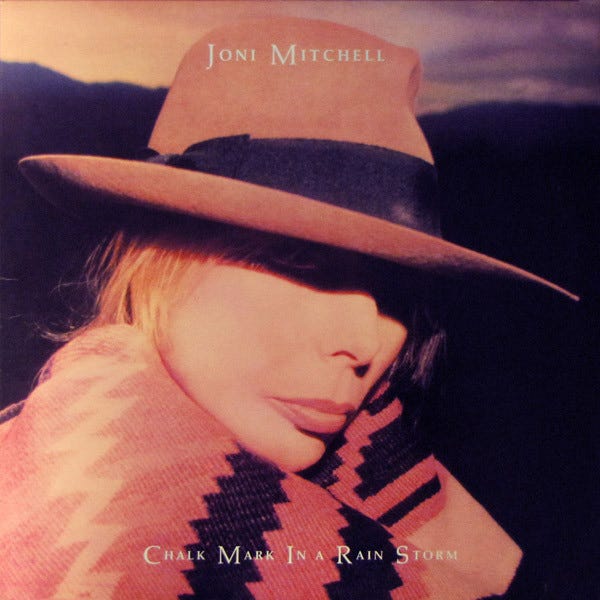[As always, some minor nips and tucks have been made to the original text.]
[Intro that was on all Stylus “On Second Thought” columns:] For better or worse, we here at Stylus, in all of our autocratic consumer-crit greed, are slaves to timeliness. A record over six months old is often discarded, deemed too old for publication, a relic in the internet age. That's why each week at Stylus, one writer takes a look at an album with the benefit of time. Whether it has been unjustly ignored, unfairly lauded, or misunderstood in some fundamental way, we aim with On Second Thought to provide a fresh look at albums that need it.
You can have your folkie Joni, the Joni of For the Roses and “Big Yellow Taxi,” Joni with her long straight hair and acoustic guitar and deadly earnestness. I want the overproduced Joni, the genius who seemingly stumbled through the 1980s making one ill-received album after another, from Wild Things Run Fast to Dog Eat Dog to, especially and most of all, Chalk Mark in a Rain Storm. Its numerous guest stars and expensive production only serve to spotlight what a great collection of songs this is. Thanks to the way these songs are buried beneath layers of reverb and gloss, you’ve got to listen harder to get to their heart — and the heart of Chalk Mark beats perhaps more strongly than that of any other Mitchell album. [I no longer feel this way — The Secret of Hissing Lawns, anyone? But this is still one of my favorites.]
Chalk Mark, produced by Mitchell and then-husband jazz bassist Larry Klein, has a sheen to it unlike any other Mitchell album; Jimmy Iovine damned near could’ve produced this. (He actually did produce another 1988 album by a ‘70s legend, Patti Smith’s Dream of Life, which is a bit more traditionally “rock” but otherwise not so far away from Chalk Mark.) This isn’t as slick as, say, Stevie Nicks’ “I Can’t Wait,” but it’s not all that far off. The album’s core band consists of Frenchman Manu Katché on drums, L.A. ‘80s studio king Michael Landau on guitar, Klein on bass and occasional keyboards, and Mitchell herself doing plenty of drums and keys programming, with most other roles played by a huge cast of guests.
And what a cast it is: Billy Idol with his right-hang axeman Steve Stevens, and Tom Petty on “Dancin’ Clown,” Willie Nelson on “Cool Water,” Don Henley on a pair of tracks, ex-Cars Benjamin Orr on a different pair, Peter Gabriel on “My Secret Place,” Iron Eyes Cody, Wendy and Lisa, Thomas Dolby, Wayne Shorter… it’s a classic Mitchell guest list, one part incredibly varied talent and one part “here are my big cool friends,” not that the two are mutually exclusive. Take opener “My Secret Place,” a lushly warm, mid-tempo duet between Mitchell and Gabriel: his voice, rich and slightly frayed-around-the-edges, matches gorgeously with Mitchell’s golden, decades-of-cigarettes tone.
While pretty much all of the album’s guests add to, rather than detract from, their respective tracks, they’re always present to serve the greater good: Our Lady Joni. Idol and Petty simply play roles on “Clown,” singing the dialogue Mitchell’s written for their characters, while Stevens adds a few of his patented hotlixxx; this is the most propulsive song on Chalk Mark, but still defiantly Mitchell’s, no matter how many guest contributors pitch in. Wendy and Lisa supply simple, lovely backing vocals for “The Tea Leaf Prophecy,” a classic Mitchell story-song about a WWII bride. Apart from the heavily processed drums Joni’s always seemed to love, this is the most timeless song here, a quietly haunting meditation on war and its effects on those left behind.
The 1936 song “Cool Water” gets some “revised lyrics” and a new Mitchell arrangement, along with vocals from Willie Nelson, whose own clear-water voice pairs well with hers. Her re-arrangement of the traditional “Corrina, Corrina,” re-titled “A Bird That Whistles,” is an oddly arresting marriage of minimalist jazz —courtesy of Klein’s popping stand-up bass and Wayne Shorter’s sax flourishes — and campfire folk in the form of Mitchell’s fairly naked vocals and acoustic guitar, that works far better than it should. That “Bird” closes the album after the tape-loop experimentation of the anti-advertising “The Reoccurring Dream” makes it all the more striking. (The commercial cut-ins in “Dream” are distracting, but its synthesized textures are gorgeous.)
Predictably, the best songs here are thanks to her sterling pen. “The Beat of Black Wings” moves on Mitchell’s keyboard swells and her astounding storytelling, which details “a young soldier / He said his name was Killer Kyle”; like “Tea Leaf,” the subject here is the effects of war, but in this case it’s largely concerned with those fighting. Mitchell gets inside her protagonist’s head so deeply we understand why he sadly says he’s “just a chalk mark in a rain storm” —a tough, heartbreaking song. “Snakes and Ladders” takes as its subject the vagaries of love and relationships and does so with a Mitchell-perfect metaphor, aided and abetted by a perfectly companionable vocal assist from Don Henley. Katché pounds out a steady beat that grounds the song without ever coming off as militaristic, which in this case would be easy to do.
Lyrically, Chalk Mark in a Rain Storm isn’t so different from her ‘70s heyday, but its severely ‘80s aural profile tends to cause listeners to dismiss it as overproduced aging-boomer muck. Oddly enough, though, it’s precisely Mitchell and Klein’s somewhat heavy-handed production that allows Mitchell’s singing and guests artists to show up and out without showing off. This is one warm, rich album which deserves to be thought of alongside Joni classics as Court and Spark, truly a lost classic.
[Originally written for Stylus Magazine in 2007.]



